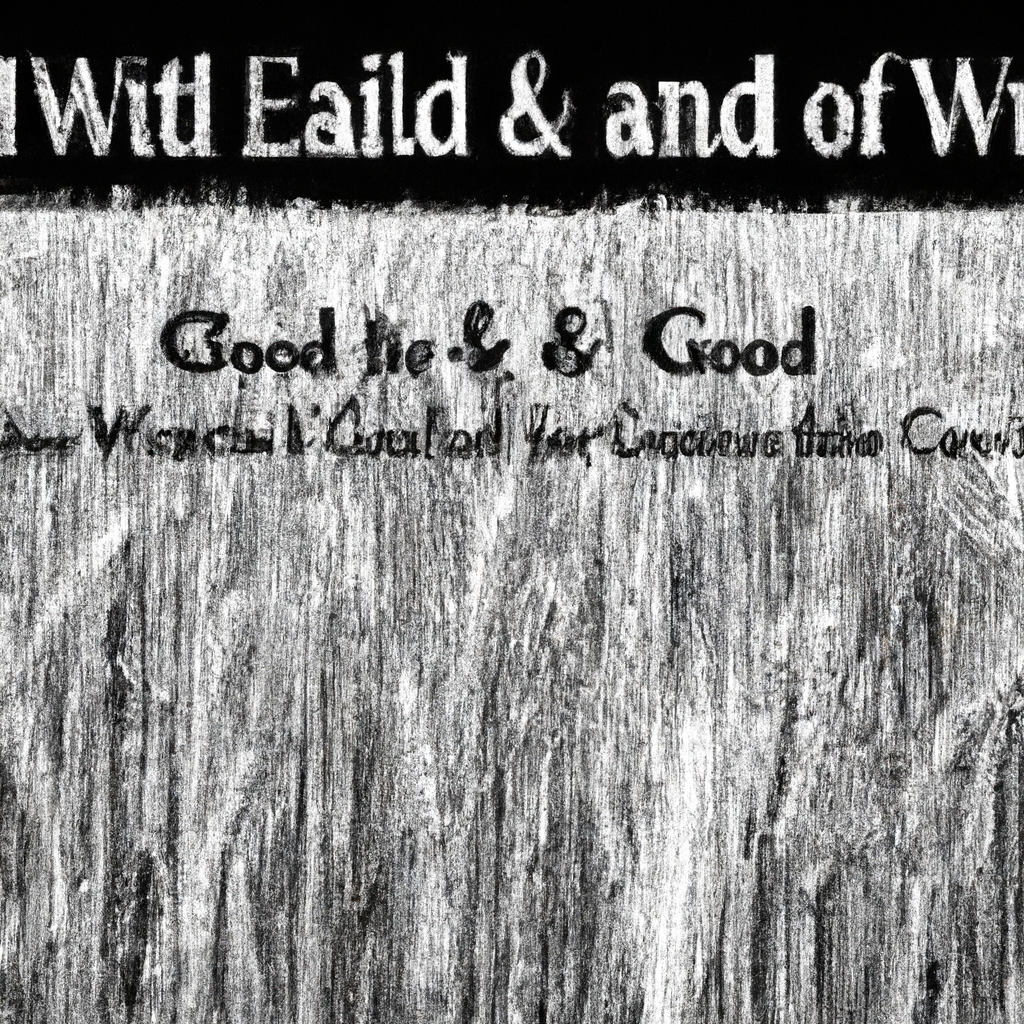In this captivating article, you will explore the insightful lessons from parables, focusing on the intriguing parable of the Wheat and the Tares found in Matthew 13:24-30. This thought-provoking parable delves into the concept of good and evil and offers a deeper understanding of their coexistence in our world. Join us as we navigate through the wisdom embedded in this biblical narrative and uncover the timeless truths it holds. Get ready to embark on a journey of reflection and illumination as we explore the significance of this powerful parable.

Background of the Parable
Meaning of parables in the Bible
In the Bible, parables are teachings that are expressed through stories or metaphors to convey spiritual and moral lessons. Jesus often used parables to explain complex concepts to his followers, using familiar elements from their everyday lives. These stories have a deeper meaning and are designed to provoke thought and encourage reflection, allowing listeners to draw personal conclusions and apply the lessons to their own lives.
Overview of Matthew 13:24-30
Matthew 13:24-30 presents the Parable of the Wheat and the Tares, one of the many parables shared by Jesus during his ministry on Earth. This parable tells the story of a farmer who sowed good wheat seeds in his field, but an enemy came during the night and scattered tares, or weeds, among the wheat. As the crops began to grow, the wheat and the tares became intertwined, making it difficult to distinguish between the two. The farmer’s servants suggested pulling out the tares, but the farmer instructed them to wait until the harvest to avoid harming the wheat.
Summary of the Parable of the Wheat and the Tares
The Parable of the Wheat and the Tares teaches valuable lessons about the coexistence of good and evil in the world, emphasizing the importance of discernment and patient waiting. In this parable, the wheat represents the children of God, while the tares symbolize the children of the evil one. The parable highlights the need to identify and separate the two, but with caution and wisdom to prevent unintentional harm. The parable also reminds us of the final separation and judgment that awaits all individuals.
Interpretation of the Parable
The sower as Jesus
In this parable, Jesus is depicted as the sower who scatters the good seeds, representing the message of the Gospel. Just as the sower carefully chooses fertile ground for the seeds, Jesus preached to different crowds, hoping to find receptive hearts that would embrace his teachings. Jesus spreads the word of God, striving to reach individuals and inspire them to grow in faith and righteousness.
The field as the world
The field mentioned in the parable represents the world itself. It symbolizes the diverse and complex environment in which humanity exists. Within this field, both good and evil coexist, mirroring the reality of our lives. The parable reminds us that we are surrounded by a mixture of righteous individuals and those who are influenced by evil forces. It is important to recognize this and navigate through the field of life with discernment and wisdom.
The wheat as the children of God
The wheat in this parable symbolizes the children of God, those who strive to live according to His will and follow the path of righteousness. As wheat grows tall and bears fruits, these individuals aim to grow spiritually and produce good works in their lives. They continually seek to align themselves with God’s purpose and glorify Him through their thoughts, actions, and relationships.
The tares as the children of the evil one
The tares, representing the children of the evil one, are weeds that infiltrate the field and hinder the growth of the wheat. They aim to disrupt and choke the wheat, hindering its development and bearing no valuable fruits. The tares symbolize those who are influenced by evil, choosing to embrace darkness rather than the light of God. They may have false appearances, but their intentions and actions ultimately lead away from righteousness.

Understanding Good and Evil
The coexistence of good and evil
The Parable of the Wheat and the Tares reminds us that both good and evil exist in the world. It acknowledges the reality of sin and the presence of individuals who choose paths that lead away from God’s teachings. This coexistence can sometimes be confusing, as the boundaries between good and evil may not always be clear. Nevertheless, the parable teaches us that righteousness and wickedness will coexist until the final judgment, emphasizing the importance of discernment and understanding.
The necessity of discernment
Discernment plays a crucial role in understanding the Parable of the Wheat and the Tares. It allows us to differentiate between the wheat and the tares in our lives. Discernment requires spiritual wisdom, developed through prayer, seeking God’s guidance, and immersing ourselves in His Word. With discernment, we can identify the influences, behaviors, and relationships that may lead us away from God’s path and distinguish them from those that promote spiritual growth.
Consequences of not discerning
Not exercising discernment can have detrimental consequences in our lives. Just as the tares hinder the growth of the wheat, the negative influences in our lives can hinder our spiritual development. Failing to discern may lead us to be easily swayed by false teachings, deceptive appearances, and harmful relationships. Without discernment, we may unknowingly compromise our values and convictions, risking spiritual stagnation or even straying from the path of righteousness altogether.
Importance of patient waiting
The Parable of the Wheat and the Tares teaches us the importance of patient waiting. The farmer in the parable instructs his servants to wait until the harvest to uproot the tares, avoiding damage to the wheat. Similarly, in our own lives, we need to exercise patience and trust in God’s timing. It is not our role to judge and separate the wheat and the tares prematurely. Instead, we should focus on personal growth and nurturing our relationship with God, leaving the final judgment and separation to Him.

Lessons Learned
The importance of discipline and separation
The Parable of the Wheat and the Tares highlights the importance of discipline and separation in our lives. Just as the farmer instructed his servants not to uproot the tares prematurely, we should exercise caution in our interactions and associations. It is crucial to discern and separate ourselves from influences and relationships that hinder our spiritual growth. By maintaining a disciplined approach and striving for separation from negativity, we create an environment that fosters personal growth and cultivates the fruitfulness of righteousness.
The danger of false appearances
One of the significant lessons from this parable is the danger of false appearances. The tares had the outward appearance of wheat, making it challenging to distinguish them from the genuine crop. Similarly, individuals may present themselves as righteous or trustworthy, but their true intentions and character may be in misalignment with God’s values. This serves as a reminder to not be easily deceived by outward appearances, but to rely on discernment and seek genuine spiritual fruit as evidence of true righteousness.
The mercy and judgment of God
The Parable of the Wheat and the Tares draws attention to the mercy and judgment of God. As the farmer in the parable chooses to allow the wheat and the tares to grow together until the harvest, we see God’s patience and desire for all individuals to have the opportunity for repentance and redemption. However, the parable also reminds us that there will come a time of separation and judgment. God, in His wisdom, will separate the wheat from the tares, ultimately rewarding the righteous and punishing the wicked.
The final separation and judgment
The parable concludes with the image of the final separation and judgment. The farmer instructs his servants to gather the tares and bind them for burning, while the wheat is collected and stored safely. This image reminds us that there will be a day when all individuals will face judgment. The parable encourages us to live according to God’s teachings, being mindful of our actions and choices, as we await the final separation and our eternal destiny.

Application to Everyday Life
Striving for personal growth and righteousness
The Parable of the Wheat and the Tares challenges us to strive for personal growth and righteousness. Just as the wheat aims to grow tall and bear fruit, we should continually seek spiritual growth and produce good works in our lives. This requires a commitment to aligning ourselves with God’s purpose, studying His Word, and seeking His guidance and transformation in all areas of our lives.
Examining one’s own heart and intentions
This parable prompts reflection and self-examination. It encourages us to examine our hearts and intentions, acknowledging that both good and evil can reside within us. Through introspection, we can identify areas where we may need to uproot the tares of negativity or sin, seeking forgiveness and the transformative power of God’s grace. It reminds us of the need for humility, repentance, and the continual pursuit of righteousness.
Being discerning in relationships and associations
The Parable of the Wheat and the Tares emphasizes the importance of discernment in relationships and associations. It encourages us to be discerning in the company we keep, recognizing the influences that may hinder our spiritual growth. We should surround ourselves with individuals who share our values and challenge us to become better versions of ourselves. Discernment allows us to identify negative influences and make wise choices that align with God’s teachings.
Practicing patience and trust in God’s timing
Finally, this parable teaches us the importance of patience and trust in God’s timing. While we may be eager to see the wheat and the tares separated, the parable reminds us that it is not our role to judge prematurely. Instead, we are called to trust in God’s sovereignty and His ultimate plan for justice and redemption. Patience allows us to focus on personal growth and rely on God’s wisdom, knowing that He will bring about the final separation at the appointed time.








